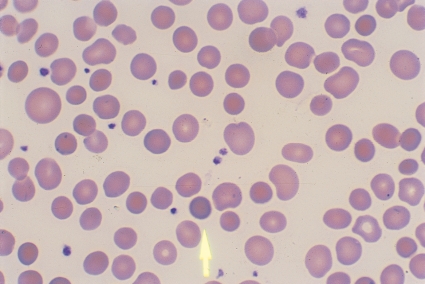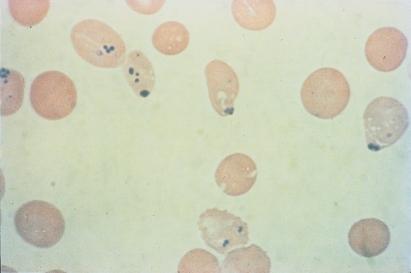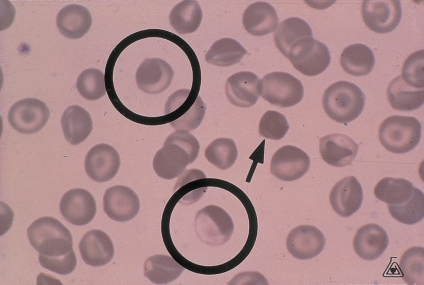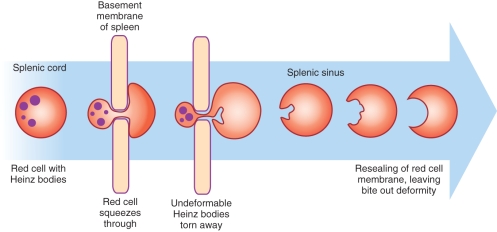Deck 7: Normochromic Anemias: Biochemical, Membrane, and Miscellaneous Red Blood Cell Disorders
Question
Question
Question
Question
Question
Question
Question
Question
Question
Question
Question
Question
Question
Question
Question
Question
Question
Question
Question
Question

Unlock Deck
Sign up to unlock the cards in this deck!
Unlock Deck
Unlock Deck
1/20
Play
Full screen (f)
Deck 7: Normochromic Anemias: Biochemical, Membrane, and Miscellaneous Red Blood Cell Disorders
1
Red cells that are rigid, provide resistance to malaria, and spoon shaped are termed:
A) Burr cells from kidney disease
B) Spherocytes from hereditary spherocytes
C) Ovalocytes from Southeast Asian ovalocytosis
D) Sickle cells from sickle cell disease
A) Burr cells from kidney disease
B) Spherocytes from hereditary spherocytes
C) Ovalocytes from Southeast Asian ovalocytosis
D) Sickle cells from sickle cell disease
C
2
Spherocytes do not function well in the splenic environment because the:
A) Osmotic environment of the spherocyte is impaired
B) Immunologic function of the spleen is impaired
C) Reservoir function is impaired
D) Filtration function of the spleen is compromised
A) Osmotic environment of the spherocyte is impaired
B) Immunologic function of the spleen is impaired
C) Reservoir function is impaired
D) Filtration function of the spleen is compromised
A
3

The cell at the tip of the pointer is referred to as a:
A) Stomatocyte
B) Target cell
C) Normal erythrocyte
D) Spherocyte
D
4
Individuals with Fanconi's anemia characteristically will have:
A) Intravascular hemolysis
B) Increased Hgb F
C) Ringed sideroblastics
D) Thrombocytosis
A) Intravascular hemolysis
B) Increased Hgb F
C) Ringed sideroblastics
D) Thrombocytosis

Unlock Deck
Unlock for access to all 20 flashcards in this deck.
Unlock Deck
k this deck
5
Cholelithiasis is a frequent complication of patients with hereditary spherocytosis because:
A) Spherocytes are an abnormal red cell morphology
B) The gallbladder does not function well in this condition
C) Continued hemolysis in this condition causes gallstones to form
D) The filtration function of the spleen is overworked
A) Spherocytes are an abnormal red cell morphology
B) The gallbladder does not function well in this condition
C) Continued hemolysis in this condition causes gallstones to form
D) The filtration function of the spleen is overworked

Unlock Deck
Unlock for access to all 20 flashcards in this deck.
Unlock Deck
k this deck
6

The inclusions pictured below are seen with supravital staining only.These inclusions are most likely:
A) Heinz bodies
B) Howell-Jolly bodies
C) Pappenheimer bodies
D) Due to stain contamination

Unlock Deck
Unlock for access to all 20 flashcards in this deck.
Unlock Deck
k this deck
7
The inability of the red blood cell to generate ATP for membrane function is most closely associated with:
A) Pyruvate kinase deficiency
B) G6PD deficiency
C) Fanconi's anemia
D) Congenital hemolytic anemia
A) Pyruvate kinase deficiency
B) G6PD deficiency
C) Fanconi's anemia
D) Congenital hemolytic anemia

Unlock Deck
Unlock for access to all 20 flashcards in this deck.
Unlock Deck
k this deck
8
An osmotic fragility test is performed on a patient's sample.Initial hemolysis occurs at 0.75% NaCl and complete hemolysis occurs at 0.50% NaCl.These results are indicative of which of the following disorders?
A) Sickle cell anemia
B) Hgb C disease
C) Thalassemia major
D) Hereditary spherocytosis
A) Sickle cell anemia
B) Hgb C disease
C) Thalassemia major
D) Hereditary spherocytosis

Unlock Deck
Unlock for access to all 20 flashcards in this deck.
Unlock Deck
k this deck
9
In hereditary spherocytosis, the reticulocyte count will typically be:
A) Less than 0.5%
B) 0.5% to 1.5%
C) 3% to 10%
D) Greater than 10%
A) Less than 0.5%
B) 0.5% to 1.5%
C) 3% to 10%
D) Greater than 10%

Unlock Deck
Unlock for access to all 20 flashcards in this deck.
Unlock Deck
k this deck
10
Spherocytes differ from normal cells in all of the following ways except:
A) Decreased surface-to-volume ratio
B) Decreased central pallor
C) Decreased resistance to hypotonic saline
D) Increased deformability
A) Decreased surface-to-volume ratio
B) Decreased central pallor
C) Decreased resistance to hypotonic saline
D) Increased deformability

Unlock Deck
Unlock for access to all 20 flashcards in this deck.
Unlock Deck
k this deck
11
Which of the following is most closely associated with G6PD deficiency?
A) Continuous intravascular hemolysis occurs.
B) G6PD is a sex linked inherited disease.
C) Splenectomy is commonly done to control symptoms.
D) The majority of the erythrocytes in these individuals are microcytic.
A) Continuous intravascular hemolysis occurs.
B) G6PD is a sex linked inherited disease.
C) Splenectomy is commonly done to control symptoms.
D) The majority of the erythrocytes in these individuals are microcytic.

Unlock Deck
Unlock for access to all 20 flashcards in this deck.
Unlock Deck
k this deck
12
One of the least severe clinical manifestations of G6PD deficiency is:
A) Acute hemolytic anemia
B) Favism
C) Neonatal jaundice
D) Congenital non-spherocytic hemolytic anemia
A) Acute hemolytic anemia
B) Favism
C) Neonatal jaundice
D) Congenital non-spherocytic hemolytic anemia

Unlock Deck
Unlock for access to all 20 flashcards in this deck.
Unlock Deck
k this deck
13
Spherocytes may enter the circulation via a variety of mechanisms.To distinguish the CBC of a patient with hereditary spherocytosis from the CBC of a patient with autoimmune hemolytic anemia, one could use the:
A) MCHC
B) Hematocrit
C) MCH
D) MCV
A) MCHC
B) Hematocrit
C) MCH
D) MCV

Unlock Deck
Unlock for access to all 20 flashcards in this deck.
Unlock Deck
k this deck
14
The deficit of which of these is most closely associated with Southeast Asian ovalocytosis?
A) Spectrin
B) Ankyrin
C) Molecular band 3
D) G6PD
A) Spectrin
B) Ankyrin
C) Molecular band 3
D) G6PD

Unlock Deck
Unlock for access to all 20 flashcards in this deck.
Unlock Deck
k this deck
15
Which of the following red blood cell membrane defects results in an increased sensitivity to complement lysis?
A) Cold agglutinin syndrome
B) Paroxysmal nocturnal hemoglobinemia
C) Diamond Blackfan anemia
D) Hereditary spherocytosis
A) Cold agglutinin syndrome
B) Paroxysmal nocturnal hemoglobinemia
C) Diamond Blackfan anemia
D) Hereditary spherocytosis

Unlock Deck
Unlock for access to all 20 flashcards in this deck.
Unlock Deck
k this deck
16

The cells circled below show an eccentric "puddling" of their hemoglobin contents.This is most closely associated with:
A) Stomatocytosis
B) Xerocytosis
C) G6PD deficiency
D) Pyruvate kinase deficiency

Unlock Deck
Unlock for access to all 20 flashcards in this deck.
Unlock Deck
k this deck
17
Bite cells are formed from:
A) The spleen "pitting" out Heinz bodies
B) Third-degree burns
C) Spectrin deficiency
D) G6PD deficiency
A) The spleen "pitting" out Heinz bodies
B) Third-degree burns
C) Spectrin deficiency
D) G6PD deficiency

Unlock Deck
Unlock for access to all 20 flashcards in this deck.
Unlock Deck
k this deck
18

The cell pictured at the tip of the pointer is known as a (an):
A) Sickle cell
B) Acanthocyte
C) Bite cell
D) Stomatocyte

Unlock Deck
Unlock for access to all 20 flashcards in this deck.
Unlock Deck
k this deck
19
The RBC inclusions that are composed of denatured hemoglobin are called:
A) Pappenheimer bodies
B) Howell-Jolly bodies
C) Heinz bodies
D) Siderotic granules
A) Pappenheimer bodies
B) Howell-Jolly bodies
C) Heinz bodies
D) Siderotic granules

Unlock Deck
Unlock for access to all 20 flashcards in this deck.
Unlock Deck
k this deck
20
An anemia that manifests as decreased marrow cellularity, pancytopenia, and a reticulocytopenia is appropriately termed:
A) Megaloblastic anemia
B) Aplastic anemia
C) Sideroblastic anemia
D) Iron deficiency anemia
A) Megaloblastic anemia
B) Aplastic anemia
C) Sideroblastic anemia
D) Iron deficiency anemia

Unlock Deck
Unlock for access to all 20 flashcards in this deck.
Unlock Deck
k this deck


